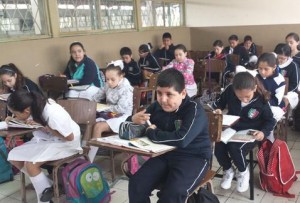
10/16/14 (written by mrangel) — Mexico’s National Human Rights Commission (Comisión Nacional de los Derechos Humanos, CNDH) has issued a general recommendation to the Secretary of Public Education (Secretaría de Educación Pública, SEP), the 31 state governments, and the head of government of the Federal District (Distrito Federal, DF) regarding the rise in complaints of sexual abuse and harassment in schools throughout Mexico. The CNDH—Mexico’s ombudsman for review of human rights issues—launched an investigation into the matter, concluding thereafter that federal and state authorities nationwide must do more to prevent, investigate, and punish perpetrators of sexual abuse and harassment, and provide better treatment to victims of such act. Published October 14, General Recommendation 21 (Recomendación General No. 21) is the CNDH’s 21st such recommendation published in 2014, and the fourth of which to be issued in part to the Secretary of Public Education.
The Commission took action on the issue of sexual abuse in schools as the number of complaints to the federal human rights commission (CNDH) and to the states’ respective human rights commissions continued to increase in recent years. From January 2000 to August 2014, 190 complaints of sexual abuse, sexual harassment, sexual violations, and inappropriate touching were registered with the CNDH against the Secretary of Public Education. As Milenio details, of the 190 complaints, 71 occurred in an elementary school setting (37%), 52 in middle school (27%), 37 in junior high or high school (19%), 24 in preschool (13%), and five in a special education setting (3%). Meanwhile, the states’ human rights commissions received 657 complaints of sexual misconduct from 2000 to 2013, and 28 of the states’ secretaries of education—of the 32 federal entities that responded to the CNDH’s request for information—documented 1,997 more complaints during the same period in public schools. It is important to note, too, that this data only reflects the reported cases of sexual abuse and harassment. Investigators caution that thousands of more cases are likely unreported (also known as the cifra negra), bringing the number of such cases even higher still.

Within General Recommendation No. 21, CNDH addressed why the abuse is so prevalent. “Sexual violence in schools is caused by the lack of preventative measures, investigations, punishment, and treatment of this phenomenon through the omissions by school authorities, among which include the lack of policy prevention and identification; in other cases the lack of administrative regulations on how to govern and proceed when faced with these types of abuses in some federal entities; and in the lack of attention mechanisms to deal with these cases in school facilities,” explains CNDH. It goes on to name that the reasons largely behind these cases stems from “the ignorance or, better said, the negligence on the school authorities’ behalf regarding the procedure that needs to be followed when a case of sexual violence in a school has been identified, and inadequate attention to the victims.”
To remedy this situation, continues the recommendation, CNDH mandated that regulations and guidelines be made for the schools on how to deal with such cases of sexual human rights violations, outlines that must state how officials should handle prevention, investigations, punishment, and reparation to the victims, as well as identify procedures for how to handle cases if they arise. CNDH adds that such regulations should remain consistent throughout schools, so as to handle and remedy the situation in similar ways across the board.
This is not the first time that the CNDH has investigated abuse in Mexican schools. The issues of bullying and school violence in Mexico gained attention in recent months, most notably after a student with learning disabilities was locked in a cage by fellow classmates in Tabasco in June 2014. One month prior to that incident, a middle school student in Tamaulipas was killed during a violent “game” played with his peers resulted in severe head injuries. The CNDH’s recent recommendation thus reiterates its demand that school violence, including both sexual abuse and bullying, must be addressed immediately.
Sources:
Jiménez, Eugenia. “Alerta CNDH sobre violencia sexual en escuelas.” Milenio. October 14, 2014.
“Recomendación General No. 21.” Comisión Nacional de los Derechos Humanos. October 14, 2014.




